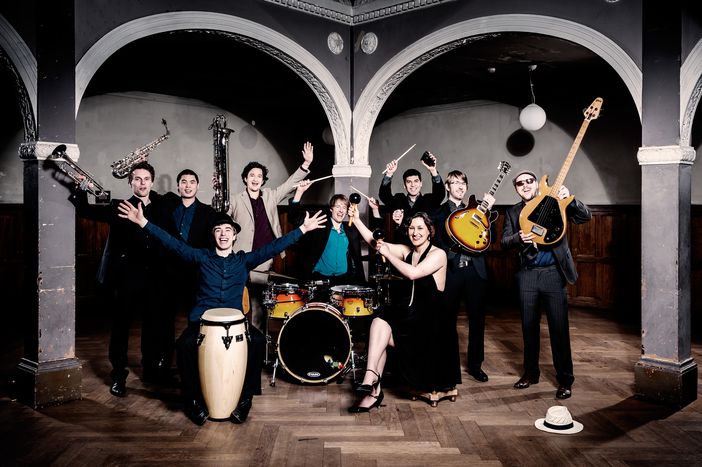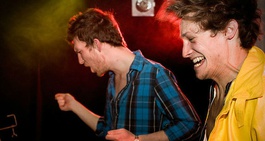
Berlin Jukebox: Esquina Latina
Published on
Translation by:
Eva KyriakouWith nine band members and many instruments “Esquina Latina” is probably one of the biggest bands of Berlin. And by doing this the band wants to establish Afro-Cuban Salsa in the capital city. Cafebabel recently spoke with three of its members.
Most people associate salsa with Latin America. Very few would think of Berlin when talking about hot sounds. But in the capital there is more than just boring melodies. Since 2010 Esquina Latina has been playing afro-cuban music here. The band makes a surprisingly new interpretation of traditional music from artists like Bebo Valdez, Ray Barretto or “Buena Vista Social Club”. And this, with nine band members, vocals and many instruments: percussion, drums, alto saxophone, bass, guitar, piano, baritone saxophone and trumpet.
How did you come up with the idea to play salsa?
Tobi: A few years ago, I took some drumming lessons and back then my teacher encouraged me towards this direction. He himself had been taught by a very famous Conga-player. This seemed to fit perfectly for us, as me and Tuz were searching something new at the time. At first Esquina Latina was, also, a kind of an art self-study-project: we captured the style and then developed our own personal voice.
Henry: This music is extremely lively and it carries me away every time, even though personally I don’t listen to it that often. However, I have a real deep connection with it, although I can’t really explain it. Moreover, like Funk and Jazz it belongs to a simple but at the same time quite complex style of art that holds so much potential for a musician.
Does any of you have a personal relationship with Latin America?
Henry: Yes, my father has a Cuban wife and I have also been in Cuba myself. Since I visited, I have a very close bond with that family and that country. That is one of the rarest spots on earth where someone can still experience the “old times”.
"Lagrimas Negras"
What is special about your music? How would you describe your personal style?
Tobi: We play Salsa. But we also have many other influences, in particular from Funk, Jazz and Blues – which is the style we originally come from.
Lea: Even if we make covers of songs, we try to enrich them: we make new arrangements, for example we might change the line of the wind instruments.
Tobi: That is also the case for electric guitars, as often they are not present in the existing arrangements.
Henry: Of course, we play Salsa, like many, but ours is “young and fresh”. We also have the flow, the vigor and the energy that comes from our public and from ourselves.
"El Cuarto de Tula"
Which are your personal role-models?
Tobi: We have been obviously inspired by the “Buena Vista Social Club”. The album is quite impressive. Personally I like “Los Van Van”, one of the Latin Jazz bands from Cuba. Apart from that, I find the fusion between Jazz and Salsa very fascinating.
Lea: Gloria Estefan is really good; especially her salsa record “Mi tierra”. I can identify with her voice and generally I like her singing style. Unfortunately there are a few women that sing salsa. I somewhat lack role-models.
Henry: Tito Puente, Perez Prado, Buena Vista Social Club and James Brown.
You have just appeared at the “Karneval der Kulturen”. The “Fete de la musique” comes next, today. What does Berlin mean to your music and for you personally?
Lea: Berlin is obviously our hometown, the city that defines us. But Berlin is also a big stage, where we go out on the streets.
Henry: Thus, we have quite a mixed public. And potentially all parts of the population can have access. Berlin is a really tolerant, fucked up, beautiful, ugly, crazy and entertaining city.
"La vida es un carnaval": Esquina Latina performed at the Carnival of Cultures 2014.
Tobi: This city provides with many possibilities to have access to music. In Wedding there is a big Turkish speaking community with respective music influences. And that goes, in principle, for all influences. You can listen to music anywhere and make it yourself. We make Salsa. There are not so many salsa bands here. Most of them are relatively small. And we are here with nine people, which is rare. But we have obviously the right sound.
And how do you see the future for Esquina Latina?
Tobi: We obviously want to try new Arrangements. This is why we have recordings already planned. Finally, we will try a small outdoor session: in parks, without the aid of technology more or less and keep everything short. Dance with everyone.
Lea: Simply put, pack our boxes and go out, for example to play in Mauerpark. We want to be mobile and to play for even more dancing crowds
If you want to watch Esquina Latina perform live, you can go to their concert tonight: The band will play at 20:00 on the stage of Arthenschutztheater (Lüneburger Str., 10557 Berlin Mitte).
CAFÉBABEL BERLIN has turned on the JUKEBOX
 Fed up with the eternal sunshine of top 10 hits, radio loops and Spotify playlists? From April 2014 onwords, we will introduce you to young musicians, DJ and live acts from Berlin who still have the musical power to surprise you. Check out the Jukebox! More tracks und playlists on Facebook and Twitter.
Fed up with the eternal sunshine of top 10 hits, radio loops and Spotify playlists? From April 2014 onwords, we will introduce you to young musicians, DJ and live acts from Berlin who still have the musical power to surprise you. Check out the Jukebox! More tracks und playlists on Facebook and Twitter.
Translated from Berlin Jukebox: Esquina Latina



